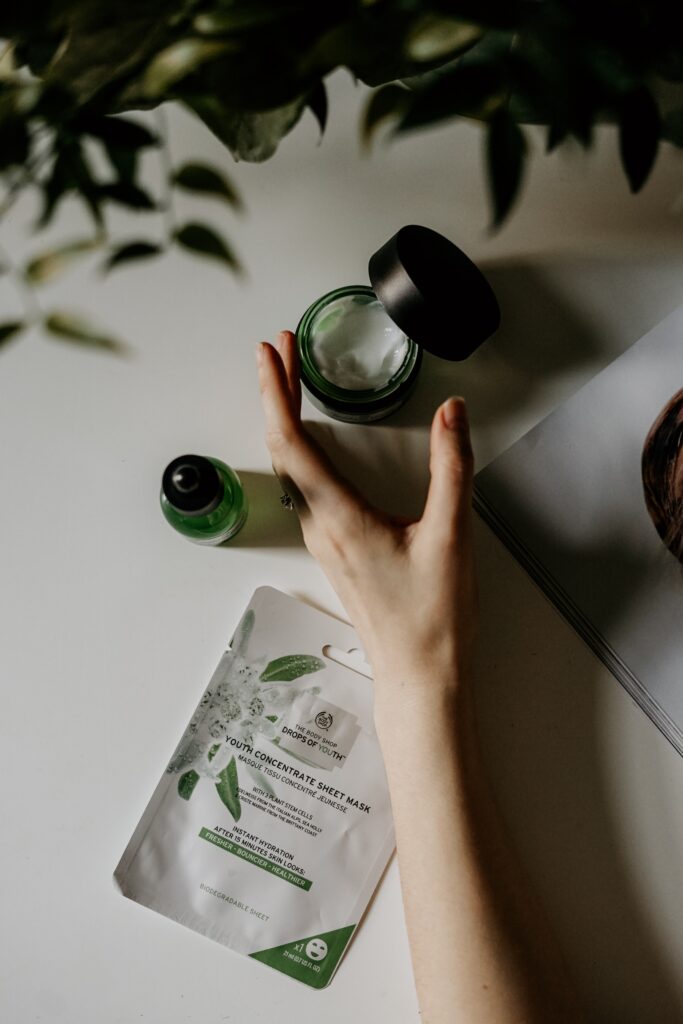Are you dreaming of having flawlessly smooth and radiant skin like porcelain? Look no further as we unravel the secrets to achieving that coveted porcelain skin you’ve always admired. In this article, we will share practical tips and insights on how to nurture and pamper your skin, unveiling a complexion that exudes a natural, dewy glow. Prepare to unlock the path to porcelain perfection and embrace a new level of skin confidence.

Understanding Porcelain Skin
What is porcelain skin?
Porcelain skin refers to a complexion that is exceptionally smooth, clear, and radiant. It is often characterized by its translucent nature and lack of imperfections such as blemishes, acne, or excessive pigmentation. Porcelain skin has a delicate and flawless appearance, akin to the smooth surface of porcelain itself. This skin type is highly sought after and admired for its ethereal beauty.
Characteristics of porcelain skin
Porcelain skin is typically pale and fair in tone, with a subtle pink or peach undertone. It lacks the presence of visible veins, making it appear almost translucent. This skin type tends to be sensitive and prone to redness, as well as being more susceptible to sun damage. Porcelain skin also has a fine texture, with small pores that give it a smooth and poreless appearance. It radiates a natural glow and has a youthful, dewy finish.
Skincare Routine for Porcelain Skin
Cleansing
Cleansing is an essential step in any skincare routine, especially for those with porcelain skin. Choose a gentle cleanser that effectively removes dirt, impurities, and makeup without stripping away the natural oils of your skin. Opt for cleansers with natural ingredients and avoid ones that contain harsh chemicals or fragrances. Remember to cleanse your face twice a day, once in the morning and once in the evening, to maintain clean and healthy skin.
Exfoliating
Exfoliating is crucial for porcelain skin to maintain its smooth and polished appearance. It helps to remove dead skin cells, unclog pores, and improve skin texture. However, be cautious when selecting exfoliating products, as abrasive scrubs can irritate and damage your delicate skin. Choose gentle exfoliators with ingredients like alpha-hydroxy acids (AHAs) or enzymes that will provide effective exfoliation without causing harm.
Toning
Toners are an excellent addition to your skincare routine, as they help restore the skin’s pH balance and prepare it for better absorption of the subsequent skincare products. For porcelain skin, opt for alcohol-free toners that are gentle and hydrating. Look for toners with ingredients like rose water or witch hazel, which have soothing and calming properties. Remember to gently apply the toner using a cotton pad or your fingertips, ensuring even coverage across your face and neck.
Moisturizing
Moisturizing is crucial for porcelain skin, as it helps to maintain its delicate balance and keep it hydrated. Look for lightweight moisturizers that are non-comedogenic and suitable for sensitive skin. Choose moisturizers that contain ingredients like hyaluronic acid or ceramides, which provide hydration without clogging pores or causing irritation. Apply moisturizer to your face and neck after cleansing and toning, both in the morning and before bed, to ensure your skin stays nourished and moisturized.

Protection from Sun Damage
Importance of sun protection
Protecting porcelain skin from sun damage is paramount, as it is more susceptible to burning and developing pigmentation issues. Prolonged sun exposure can not only cause premature aging, but it can also increase the risk of skin cancer. Consistently using proper sun protection measures is essential to maintain the radiant and flawless appearance of porcelain skin.
Using sunscreen
One of the most crucial steps in protecting your porcelain skin from sun damage is using sunscreen. Look for a broad-spectrum sunscreen with an SPF of 30 or higher, and apply it generously to all exposed areas of your skin. Make sure to reapply every two hours, especially if you’re spending extended periods in the sun or participating in water activities. Choose sunscreens that are specifically formulated for sensitive skin to minimize the risk of irritation.
Wearing protective clothing
In addition to sunscreen, wearing protective clothing is an effective way to shield your porcelain skin from harmful UV rays. Opt for lightweight, long-sleeved shirts, pants, and wide-brimmed hats to cover exposed areas. Consider investing in clothing with UPF (Ultraviolet Protection Factor) to provide extra protection. Don’t forget to wear sunglasses with UV protection to shield your eyes and the delicate skin around them.
Avoiding peak sun hours
To further protect your porcelain skin, it’s advisable to avoid prolonged exposure to the sun during peak hours, typically between 10 a.m. and 4 p.m. During these hours, the sun’s rays are at their strongest, posing a higher risk of sunburn and skin damage. If you must be outside during these times, seek shade as much as possible and take regular breaks indoors to allow your skin time to rest and recover.
Eating a Healthy Diet
Importance of nutrition for skin
Maintaining a healthy diet is not only essential for your overall well-being, but it also plays a significant role in the health and appearance of your skin. Consuming a balanced diet rich in vitamins, minerals, and antioxidants can help nourish and rejuvenate your porcelain skin from within. The nutrients you provide your body will reflect on your skin, contributing to its clarity, radiance, and overall health.
Food choices for porcelain skin
When it comes to food choices for porcelain skin, focus on incorporating a variety of fruits, vegetables, whole grains, and lean proteins into your diet. Opt for foods that are rich in antioxidants, such as berries, leafy greens, and nuts, as they can help neutralize harmful free radicals and reduce inflammation. Additionally, foods containing omega-3 fatty acids, such as fatty fish or chia seeds, can help maintain the suppleness and elasticity of your skin.
Drinking plenty of water
Staying hydrated is fundamental to achieving and maintaining porcelain skin. Drinking plenty of water helps flush out toxins from your body, improving your skin’s overall appearance and preventing dullness. Aim to drink at least eight glasses of water per day and more if you’re physically active or live in a drier climate. Additionally, reduce your consumption of sugary and caffeinated beverages, as they can dehydrate your skin and contribute to inflammation.

Avoiding Harmful Habits
Quitting smoking
If you’re a smoker, quitting is one of the kindest things you can do for your porcelain skin. Smoking damages collagen and elastin, which are essential for maintaining the firmness and elasticity of your skin. It also constricts blood vessels, reducing blood flow and depleting your skin’s oxygen supply. Over time, smoking can lead to wrinkles, sagging skin, and a dull complexion. Quitting smoking will not only benefit your skin but also improve your overall health.
Minimizing alcohol intake
Excessive alcohol consumption can have detrimental effects on your skin, including dryness, redness, and premature aging. Alcohol is dehydrating and can strip your skin of its natural moisture, leading to a lackluster appearance. It can also exacerbate skin conditions such as rosacea or acne. Limit your alcohol intake and opt for hydrating alternatives like water or herbal teas to keep your skin healthy and radiant.
Avoiding excessive caffeine consumption
While caffeine can provide a temporary energy boost, excessive consumption can have negative effects on your porcelain skin. Caffeine acts as a diuretic, depleting your body of fluids and leading to dehydration. This can result in dry, flaky skin and a dull complexion. Limit your caffeine intake and balance it out with ample hydration to ensure your skin remains hydrated and glowing.
Getting enough sleep
Adequate sleep is crucial for maintaining healthy skin, including porcelain skin. During sleep, your body repairs and rejuvenates itself, including your skin. Lack of sleep can lead to an increase in stress hormones, which can trigger inflammation and breakouts. Aim for at least seven to eight hours of quality sleep each night to allow your skin ample time to regenerate and restore its natural balance.
Using Gentle Products
Avoiding harsh chemicals
Porcelain skin is delicate and sensitive, making it crucial to steer clear of skincare products containing harsh chemicals. Harsh ingredients such as sulfates, parabens, and synthetic fragrances can strip away your skin’s natural oils, disrupt its pH balance, and cause irritation. Opt for products that are free from these harsh chemicals and instead choose ones with natural and soothing ingredients that won’t compromise the health and appearance of your porcelain skin.
Choosing suitable skincare products
When selecting skincare products for porcelain skin, it’s essential to choose ones specifically formulated for your skin type. Look for products that are labeled as gentle, hypoallergenic, or made for sensitive skin. These products are formulated to be mild and less likely to cause irritation. Additionally, consider products that contain calming ingredients like aloe vera, chamomile, or oat extract to soothe and nourish your porcelain skin.
Testing products before use
Before incorporating any new skincare product into your routine, it’s essential to perform a patch test to ensure it doesn’t cause adverse reactions. Apply a small amount of product to a discrete area, such as your forearm, and wait 24 to 48 hours to observe any potential allergic reactions or irritations. If no adverse reactions occur, you can safely incorporate the product into your daily skincare routine.
Adopting a Daily Skincare Routine
Washing your face twice a day
To maintain the health and radiance of your porcelain skin, it is crucial to wash your face twice a day. In the morning, cleansing your face helps remove any sweat, oil, or impurities that may have accumulated overnight. In the evening, it eliminates makeup, dirt, and pollutants that have built up throughout the day. Use lukewarm water and a mild cleanser to gently massage your face in circular motions, paying attention to your T-zone and any areas prone to congestion.
Using a gentle cleanser
When selecting a cleanser for your porcelain skin, opt for one that is gentle and non-irritating. Avoid cleansers with harsh sulfates or fragrances, as they can strip your skin of its natural oils and cause dryness or irritation. Look for cleansers that are specifically formulated for sensitive or delicate skin, and ones that contain hydrating ingredients like hyaluronic acid or glycerin. After cleansing, gently pat your skin dry with a soft towel.
Applying toner
Toner is an important step in your skincare routine, as it helps balance your skin’s pH levels and prepares it for better absorption of subsequent products. For porcelain skin, choose an alcohol-free toner that is gentle and hydrating. Look for toners that contain ingredients like rose water, chamomile, or witch hazel, as they have soothing and calming properties. Apply the toner by either pouring a small amount onto a cotton pad or by gently patting it onto your face and neck with clean hands.
Using moisturizer
Moisturizing is a crucial step for porcelain skin, as it helps keep it hydrated and maintain its delicate balance. Look for lightweight moisturizers that are non-comedogenic and suitable for sensitive skin. Choose moisturizers that contain ingredients like hyaluronic acid, ceramides, or shea butter, as they provide hydration without clogging pores or causing irritation. Apply an even layer of moisturizer to your face and neck, gently massaging it in using upward circular motions.
Using face masks or serums
Face masks and serums can be excellent additions to your porcelain skin routine, providing targeted treatments and additional nourishment. Look for face masks or serums that are formulated with ingredients like vitamin C, niacinamide, or hyaluronic acid, which can help brighten, hydrate, and refine your complexion. Incorporate them into your routine a couple of times a week, following the instructions provided by the product, to enhance the radiance and overall health of your skin.
Taking Care of Problematic Skin
Dealing with acne
While porcelain skin is typically clear and blemish-free, occasional acne breakouts can still occur. To deal with acne, opt for gentle acne-fighting products that won’t irritate or overdry your skin. Look for products containing salicylic acid or benzoyl peroxide, which can help unclog pores and reduce inflammation without causing excessive dryness. Avoid picking or squeezing your pimples, as it can lead to scarring. If acne persists or worsens, consider consulting a dermatologist for personalized treatment options.
Treating hyperpigmentation
Hyperpigmentation refers to areas of the skin that are darker in color, typically caused by excessive melanin production. To treat hyperpigmentation, incorporate products with ingredients like vitamin C, niacinamide, or alpha-arbutin into your skincare routine. These ingredients can help brighten the skin, fade dark spots, and even out skin tone. Be patient, as treating hyperpigmentation requires consistent use of targeted products and may take time to see significant results.
Managing skin sensitivity
Porcelain skin is often inherently sensitive, making it essential to manage and minimize any potential irritations. Avoid using products with harsh ingredients, fragrances, or artificial colors, as they can trigger sensitivity and redness. Opt for gentle and soothing products specifically made for sensitive skin. Additionally, protect your skin from extreme temperatures and avoid excessive rubbing or scrubbing. If you experience persistent sensitivity or discomfort, consult a dermatologist for further guidance.
Handling fine lines and wrinkles
While porcelain skin may have fewer fine lines and wrinkles compared to other skin types, signs of aging can still be a concern. To address fine lines and wrinkles, incorporate skincare products that contain ingredients like retinol, peptides, or hyaluronic acid into your routine. These ingredients can help promote collagen production, plump the skin, and reduce the appearance of fine lines. Be consistent with your skincare routine and patient, as results may take time to manifest.
Getting Professional Help
Consulting a dermatologist
If you have concerns about your porcelain skin or any persistent skin issues, consider consulting a dermatologist. Dermatologists are medical professionals trained in diagnosing and treating a wide range of skin conditions. They can provide personalized advice and recommend specific treatments tailored to your skin’s needs. Whether it’s controlling acne, addressing hyperpigmentation, or managing sensitivity, a dermatologist can help guide you towards the best solutions for your porcelain skin.
Considering professional treatments
Professional treatments can be an effective way to address specific skin concerns and enhance the appearance of your porcelain skin. Treatments such as chemical peels, microdermabrasion, or laser therapy can help improve skin texture, reduce pigmentation, and promote collagen production. However, always consult with a dermatologist or licensed esthetician before undergoing any professional treatments to ensure they are suitable for your skin type and properly administered.
Getting regular facials
Regular facials can be a beneficial addition to your skincare routine, helping to deep clean, exfoliate, and nourish your porcelain skin. Professional aestheticians are trained to analyze and address your skin’s specific needs, whether it’s addressing congestion, hydrating dry patches, or targeting signs of aging. Prioritize facials that are tailored to your skin type and concerns, and discuss any sensitivities or allergies with your esthetician to ensure a safe and effective treatment.
Maintaining Overall Health
Exercising regularly
Regular exercise not only benefits your overall health but also has positive effects on your skin, including porcelain skin. Exercise improves blood circulation, which helps deliver oxygen and nutrients to your skin cells, resulting in a radiant complexion. Additionally, exercise helps reduce stress levels, which can contribute to a healthier and clearer complexion. Choose activities that you enjoy and aim for at least 30 minutes of moderate exercise most days of the week.
Managing stress levels
Chronic stress can negatively impact your skin’s health and appearance, leading to breakouts, redness, and dullness. It’s important to manage stress levels to maintain the vitality of your porcelain skin. Engage in activities that help alleviate stress, such as practicing yoga, meditation, or deep breathing exercises. Additionally, ensure you have a healthy work-life balance, prioritize self-care, and seek support from loved ones or professionals if needed.
Getting enough sleep
Adequate sleep is crucial for maintaining overall health, as well as the health and appearance of your skin. During sleep, your body repairs and rejuvenates itself, including your skin. Lack of sleep can lead to an increase in stress hormones, which can trigger inflammation and breakouts. Aim for at least seven to eight hours of quality sleep each night to allow your skin ample time to regenerate and restore its natural balance.
Avoiding excessive alcohol and smoking
In addition to the specific skincare steps mentioned earlier, it’s important to avoid excessive alcohol consumption and tobacco smoke for the sake of your overall health and the condition of your porcelain skin. Both alcohol and smoking have detrimental effects on your skin, accelerating the aging process, causing dehydration, and impairing your skin’s ability to heal and regenerate. Limit alcohol intake and quit smoking to maintain the radiance and natural beauty of your porcelain skin.

